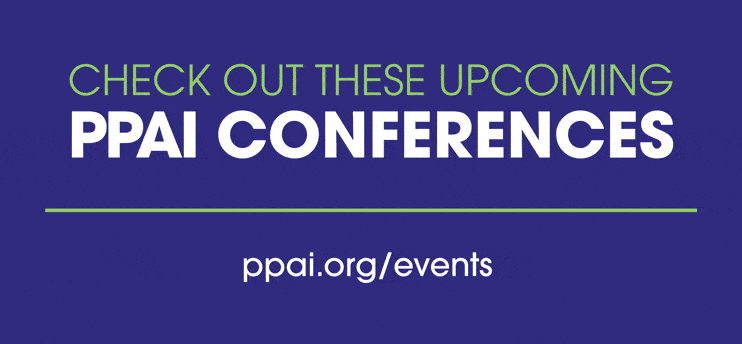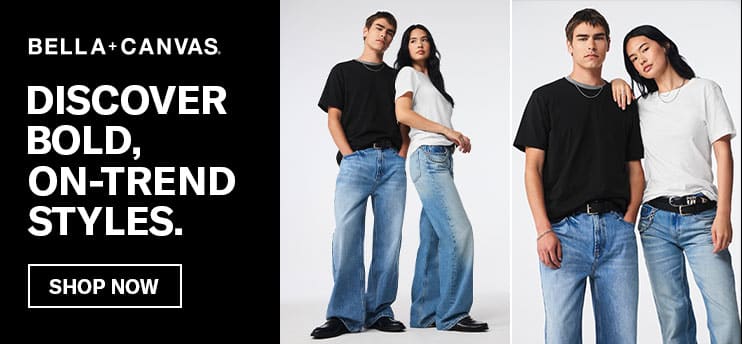The women behind Cleveland, Ohio-based distributor Moore & Moore Merch knew one day they’d become entrepreneurs. “I am an entrepreneur at heart, so I always just knew,” says Sonjia Smith. “I didn’t know in what capacity, but I did know I wanted to do something with family, particularly these two young ladies—my first cousins.”
Smith, together with Quianne Perrin Savoy and Shandrea Patton, opened their family-run distributor in May 2017, combining curated marketing ideas with fresh merchandise. All three women have backgrounds in marketing and graphic design, and whenever they’d gather for the holidays, the conversation would eventually turn toward their clients’ needs and what they were going to do next. “It morphed into something that we knew we could provide for our clients that they weren’t getting anywhere else,” says Savoy.
Today, Moore & Moore Merch, the name paying homage to their great-grandmother Ruby Mae Moore, is a marketing boutique that helps clients find useful and tangible products to help tell the story of their brand. “For the longest [time] we’ve all had these creative ideas that we’ve wanted to put into play,” says Patton. “Some things we would try and some things we didn’t, but it was always something that was there that we would talk about. We wanted to pursue something on our own and even just to do something for our family, having something to [inspire] the younger generations and a place where our kids can one day come in behind us to take the reins. It took a little bit of time to figure out what our business was going to be and how to mesh it all together, which is how Moore & Moore was started.”
Armed with a full client database, Moore & Moore began creating merchandise for events, from women’s conferences to music festivals. But being new to the industry came with its obstacles. “The biggest challenge was a lot of not knowing and trying to figure things out,” says Smith. “We didn’t have a mentor in the industry.” The next biggest challenge surrounded figuring out systems to maintain workflow and consistency. “It’s always a learning process,” says Patton. “Some things work for us while some things don’t, so we’re learning how to figure that out. I think these first few years have been great in learning how to grow a business. It’s like having a new baby and watching it grow while you’re taking advice from others, but still trying to make it your own as well.”
PPB spoke with the trio to learn more about their company and their experiences in the industry.
PPB What are some things you’ve learned about running your own business?
Quianne Perrin Savoy It’s so cliché, but what you put in is what you get out. We really see that firsthand, and we are at the point now where we don’t want to put too much in because we don’t want to get too much out right now. We kind of know how to ‘water the baby’ now, and we aren’t ready for all that yet. We are having to pace ourselves to focus on getting our systems down, but we’ve already learned so much that we’ll be ready when the time comes. Another thing that I love is that we’ve had some really great clients; people that we knew initially starting out, that we were able to kind of cut our teeth on. So, if something was a little messed up, it wasn’t as big of a deal as it may have been for someone we’ve never worked with before and didn’t know. Although we do stand behind our products and we are going to make it right for our clients, that was something really helpful in the beginning. For instance, there was a notebook that I ordered, and it was something so simple, but I didn’t check the dimensions. This was a miniature notebook and the client wanted a full-sized notebook. This notebook was so small; that mistake could have been an issue, but it wasn’t. Just having that grace from clients has been really helpful because now we know to double-check and triple-check things like that.
PPB Why and when did you join PPAI and how would you describe your experience in the industry so far?
Sonjia Smith We are pretty fresh. I believe we joined in December, and we went to our first Expo this past January. We knew at some point that we wanted to get involved with some of the organizations within the industry, and that opportunity came up and we are so glad that we joined. From my own experience, and I’ve discussed this with Quianne and Shandrea, I’ve noticed that the industry seems older. Even when we got on the topic of some of the imagery in the industry, a lot of it seems to be outdated. Being within the industry and even when I had a short stent at a distributor, I just felt that things were so archaic. Now that I’ve joined PPAI, I started seeing more modern and hip things happening.
Quianne Perrin Savoy One of the things that I enjoy about our industry is so silly, but it’s that Facebook group, Promotional Products Professionals. It’s a really great resource and things like that are cool because I can go on there looking for a product, then boom, I find it along with a referral. I enjoy the camaraderie and how we help each other in this industry. I like how promotional products touch so many industries and people. I’ve noticed if someone is raving about an event, it’s probably because they got a really good promo item. I just love that part of it and how we can be creative.
PPB As Black women business owners, what advice do you have for other minority entrepreneurs, especially other women?
Sonjia Smith Get a good mentor to help guide you along the way. Ask questions; don’t be afraid to ask questions. Also, seek out other minority business owners. I think that is something that we can all benefit from.
Quianne Perrin Savoy I would say to definitely search for podcasts you can listen to. [See PPB’s podcasts below] I am a podcast junkie and there are so many out there. The guests [the podcasts] bring on are often people who you can reach out to in real life and have a conversation with. Normally, those people are looking forward to hearing from you. I would also say to get involved. Have a list of people you want to talk to or meet when you attend a show or conference. Be active on social media. There are hashtags to help connect you with people within our industry. And as much as you’re wanting help, make sure you’re giving it as well. It’s not all about taking but having something to give as well. The last thing I would say is to find ways to partner.
Shandrea Patton For someone opening a minority-owned business, I would say stay the long haul. It’s not going to be easy; things are not going to go perfectly the first time around. And to not give up. You may hear a lot of no’s, spend more money than you plan on spending and have a lot of doors close on you, but keep pushing at it because if you have the passion for it, doors will start to open and things will come together.
–––––––––––––––––––––––––––––––––––––––––––––––––––––––––––
PromoTalks, PPAI’s official podcast, invites industry leaders and subject-matter experts to discuss issues within and surrounding the industry. From how to sell, how to lead and how to navigate difficult times, listeners can depend on PromoTalks for an exclusive look into what industry professionals are talking about. Access them free on Spotify and Apple Podcasts at promotalks.buzzsprout.com.
PPB Presents: Women of Achievement: A Conversation With Three Who’ve Inspired An Industry
June 30, 2020
PPB Presents: Company Rebranding: How To Get It Right
June 9, 2020
PPB Presents: Selling In A Post-Coronavirus World
May 21, 2020
PPB Presents: Leadership In A New Reality
April 22, 2020
PPB Presents: Why Video, Why Now? The Basics You Need to Get Started
April 8, 2020
PPB Presents: Effects of the Coronavirus on the Promotional Products Industry
March 13, 2020
–––––––––––––––––––––––––––––––––––––––––––––––––––––––––––
Kristina Valdez is associate editor of PPB.


